Biodiversity
It's all down to diversity
A well-functioning ecosystem is more than just a pretty landscape. It provides us with clean drinking water, healthy soil and space for relaxation. Our lives depend on the natural diversity of our ecosystems. Preserving these ecosystems and counteracting the dramatic extinction of species taking place on our doorstep is an urgent task; one which farmers, conservationists, politicians and consumers can only tackle together – and tackle it, they must.
WHAT DOES ORGANIC FARMING DO FOR BIODIVERSITY?
Beyond the basic system services of organic agriculture, many Naturland farmers want to do even more to actively promote biodiversity on their land. For this reason, Naturland cooperates with the nature conservation association LBV (Landesbund für Vogelschutz) to jointly develop biodiversity know-how for Naturland farms in Germany and Austria and to set up a biodiversity advisory service. The aim is to identify and implement measures that are individually adapted to each farm and that create real, additional added value for biodiversity. This is how we create more habitat for plants and animals together!
ABOUT ORGANIC FARMING AND BIODIVERSITY
The Naturland approach to organic farming and biodiversity is explained briefly and clearly in the following video.
Data protection notice: By clicking on the Youtube video, you agree to our data protection provisions.
Video below in German language.
What we stand for
Your contact
NATURLAND AND THE LBV – WORKING TOGETHER TO PROMOTE BIODIVERSITY
Promoting biodiversity in agriculture is a common goal for both Naturland and the LBV (Bavarian Bird Protection Society). As part of a partnership forged in 2019, our two associations are working together to establish a biodiversity consultation service for Naturland farms in Germany. The LBV is Bavaria's oldest nature conservation society and has been campaigning to preserve biodiversity for over 111 years. With the support of over 100,000 members, the LBV protects Bavaria's local biodiversity.
BIODIVERSITY CONSULTANCY
Providing advice on this specific topic is instrumental when it comes to ensuring that nature conservation measures are implemented successfully within agriculture. Farmers find it especially helpful when advisers are able to take into account aspects related to both farming and conservation. “Our aim is to integrate biodiversity into the farm's day-to-day operations. So we provide suggestions that will help farmers find the right measures for their farm”, says LBV Farm Adviser Matthias Luy. Developing a practical biodiversity consultancy service is the first joint project undertaken by LBV and Naturland. Members of Naturland's professional consultancy team receive training, which they then pass on to Naturland farms across the country. According to Thomas Neumaier, one of Naturland's lead consultants, “Promoting biodiversity must become an integral part of our consultancy work. After all, biodiversity supports a wide range of agricultural processes such as natural pollination and pest control. That’s why we need to consider organic farming and nature conservation as mutually dependent and complementary components of the same system”.
GUIDE TO BIODIVERSITY ON NATURLAND FARMS
The "Guide to Biodiversity on Naturland Farms" was developed from the experience of the joint training courses of the advisory service for Naturland and the nature conservation association LBV. It is intended to support Naturland members in promoting biodiversity on their farms.
The guide was produced by Naturland in close cooperation with the LBV. "The combined expertise of nature conservation and organic farming," explains LBV chairman Norbert Schäffer, "offers the best conditions for effectively promoting biodiversity on Naturland farms." In a mutual exchange, measures could be worked out that can now be passed on to the farms in the form of this brochure. The guideline is far more than a catalogue of various individual measures: The focus is on a whole-farm approach in which agricultural production and active species conservation are consistently "thought together". "In this sense, the biodiversity guideline offers a variety of possibilities from which all Naturland farms can draw," says Hubert Heigl, Naturland President.
EXAMPLE CONSULTANCY TOPICS
- Diversity on arable land
- Naturland use of grass-clover ley
- Phased grassland use
- Scattered fruit trees
- Nature conservation in the farmyard
-
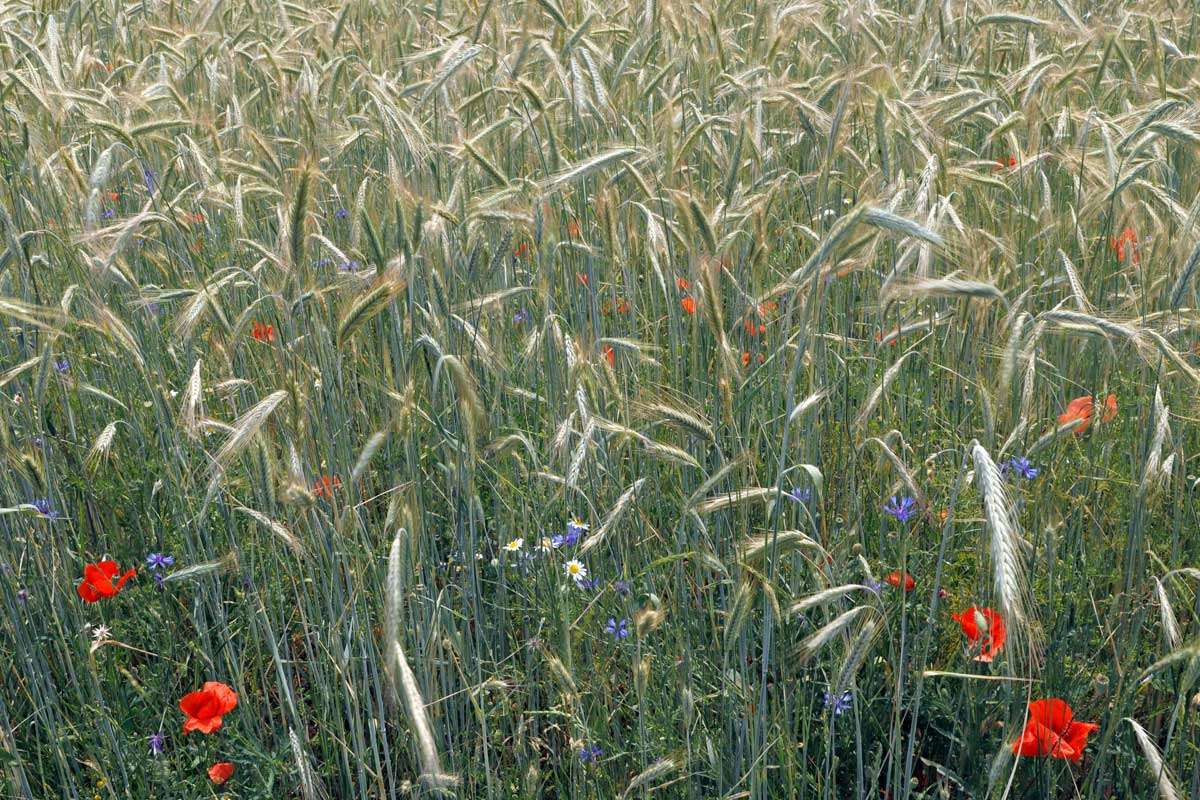
Diversity on arable land
When arable land is left undisturbed, it gives rise to a plethora of wild herbs. This diverse range of arable flora – especially rare and endangered species – should be encouraged with appropriate farming methods. This also indirectly protects insects, birds and mammals.
This email address is being protected from spambots. You need JavaScript enabled to view it. Picture: Field Weeds in Winter Rye © Dr. Dietmar Pilotek -
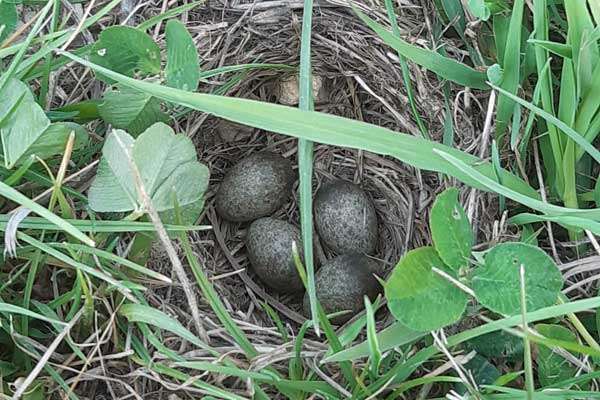
Naturland use of grass-clover ley
Clover and lucerne are core components in organic crop rotation schemes and provide habitats for a range of different animals. Depending on the location, it's also used as a forage crop in organic farming around three to five times per year. These mixed crops provide habitats for a wide range of organisms such as insects and typical field-dwelling species like hares. Specific protective measures that could be introduced include set-aside strips, rest periods and the use of a double-action sickle bar mower. The key is to weigh up the conservation goals for each farm against the potential harvest losses. We will show you how to make this work.
This email address is being protected from spambots. You need JavaScript enabled to view it. Image: Lark's nest in grass-clover © Christian Niebler -
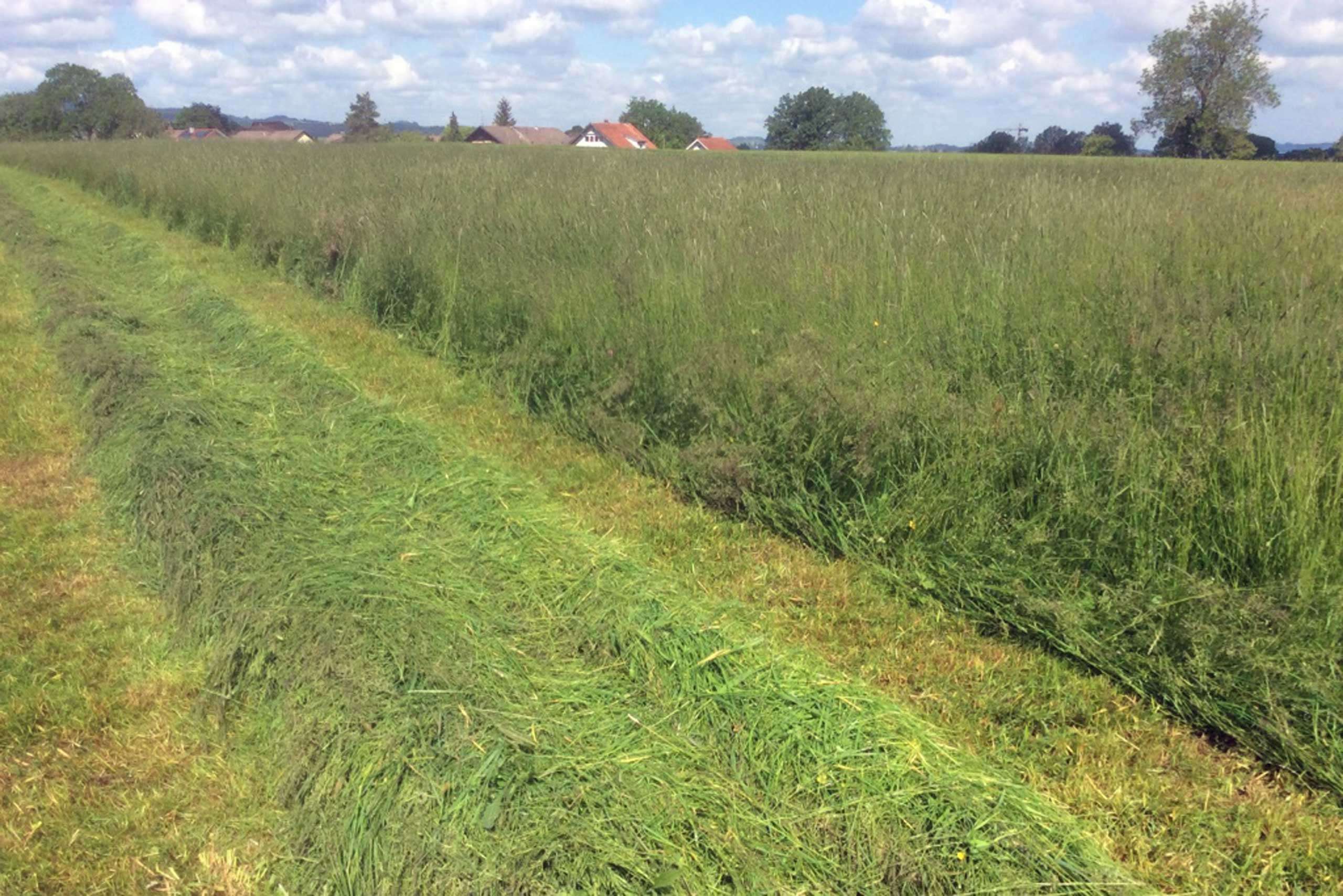
Phased grassland use
In phased grassland use, more vigorously growing areas are utilised more intensively by fertilising and overseeding them accordingly and implementing an appropriate mowing regime. In contrast, lower-yielding fields are deliberately extensified and treated with biodiversity boosting measures. In this way, phased grassland use can have a valuable impact on biodiversity.
This email address is being protected from spambots. You need JavaScript enabled to view it. Image: Part of the area is left standing and harvested at a later date © Richard Haneberg -
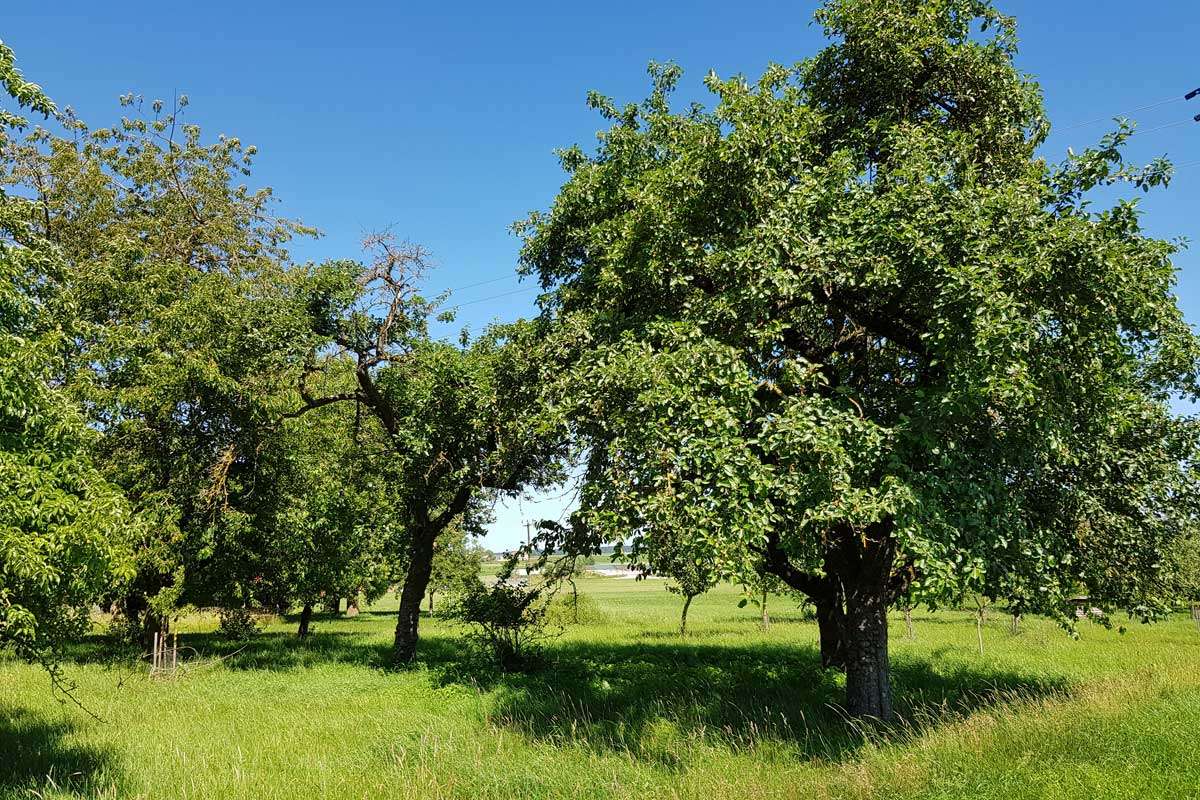
Scattered fruit trees
Scattered orchards provide one of the most species-rich habitats with over 5000 animal and plant species. Their flowers and fruit provide species such as wild bees, honeybees, birds, bats, small mammals and not least us humans with an abundance of food. Ancient scattered orchards are one of most endangered biotopes in Germany.
This email address is being protected from spambots. You need JavaScript enabled to view it. Meadow with scattered fruit © Naturland -
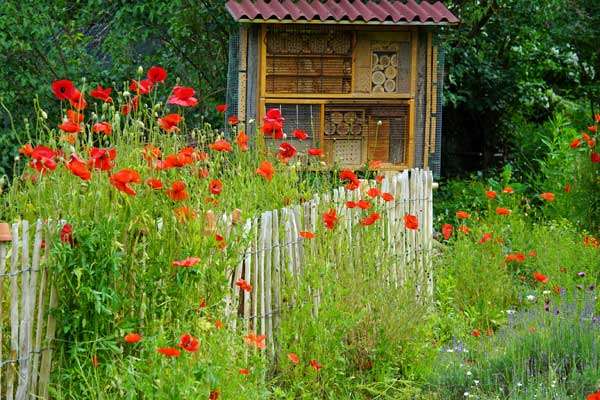
Nature conservation in the farmyard
A farmyard with a kitchen garden and outbuildings offers great potential for promoting biodiversity. A wide variety of structures and habitats can be created for insects, frogs, birds and mammals to inhabit, even in the smallest of spaces.
This email address is being protected from spambots. You need JavaScript enabled to view it. Insect hotel & cottage garden © Thomas Staab, naturfotos.lbv.de
Videos about biodiversity on Naturland farms
In the summer of 2020, we created a series of videos to show the biodiversity on Naturland farms. In conversation with Naturland farm managers, LBV experts explain which measures our farmers take in addition to farming organically to boost biodiversity in their fields and meadows. The videos will be published in random order on our YouTube channel. (Video below in German language)
Data protection notice: By clicking on the Youtube video, you agree to our data protection provisions.
Videos below in German language.
‘COLOURFUL’ FIELDS ON THE WEISS NATURLAND FARM
Otto and Irene Weiß run a Naturland farm in the Franconian Jura, which is just on the border of romantic Franconian Switzerland. They converted to organic farming 30 years ago and have been actively encouraging biodiversity ever since.
Language: German
INSECT PARADISE ON THE ZACH NATURLAND FARM
Naturland member Leonhard Zach runs a dairy farm in Bavaria. He promotes biodiversity on his farm by planting wildflower meadows and refraining from the use of chemical pesticides and fertilisers.
Language: German
ORGANIC EXCAVATORS ON THE REISSAUS NATURLAND FARM
The Reißaus family lives on the Naturland farm “Der Reiserer” with their herd of water buffaloes. Matthias Reißaus lovingly refers to them as his "organic excavators". Water buffaloes need ponds to maintain their body temperature. Their wallowing behaviour creates pools of water, which in turn create habitats for endangered amphibians such as yellow-bellied toads.
Language: German
Portrait of farms with special biodiversity measures
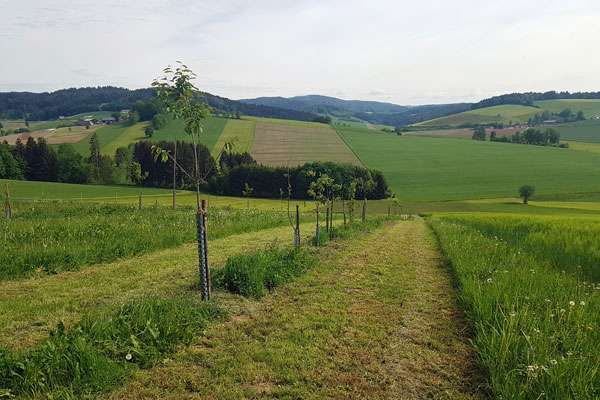
Bogner farm and Schedlbauer farm
The demands on agriculture have changed significantly in recent years. In addition to the production of high-quality, healthy food, topics such as eco-balance, sustainability and biodiversity are increasingly gaining interest. Naturland farmers Barbara Schedlbauer and Christina Windmaißer have already embarked on this path.
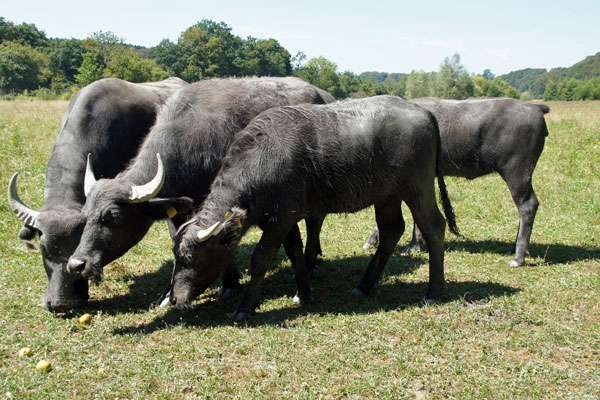
"Der Reiserer"
Josefine and Matthias Reißaus from the Naturland farm "Der Reiserer" breed water buffalo and Murnau-Werdenfelser cattle for their suckler herd. The animals graze various project areas in the summer half-year - creating habitats for rare animal and plant species. The meat is sold ex-farm to private customers and to the eco kindergarten catering.
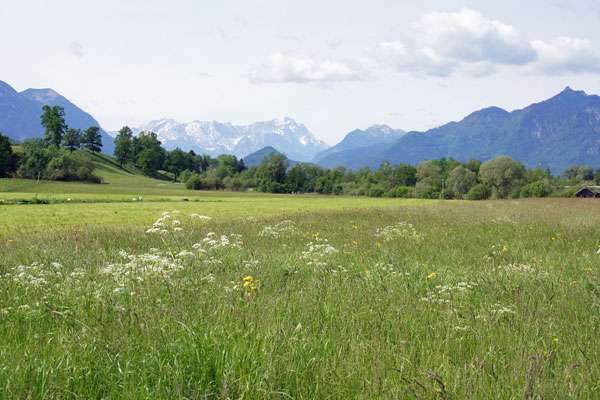
Leonhard Zach
Leonhard Zach is a Naturland farmer in Ohlstadt, Upper Bavaria. Together with Alois Benedikt, he runs the Zugspitzblick dairy farm as a GbR. He carefully manages species-rich meadows and pastures. In addition, he is involved in politics and associations for the promotion of biodiversity in agriculture.



